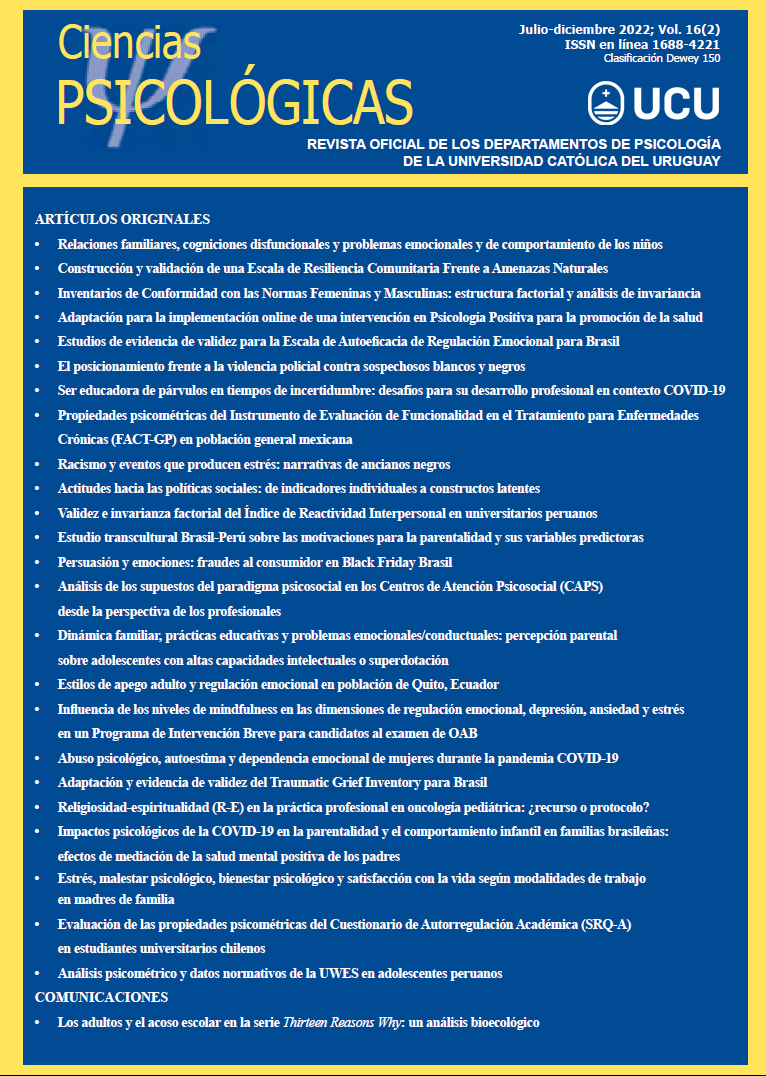Adaptação e evidências de validade do Traumatic Grief Inventory para o Brasil
DOI:
https://doi.org/10.22235/cp.v16i2.2442Palavras-chave:
morte, avaliação psicológica, saúde mental, luto, propriedades psicométricas, análise fatorialResumo
O objetivo do presente estudo foi verificar as evidências de validade da versão reduzida adaptada para o português do Brasil do Traumatic Grief Inventory, por meio de uma análise fatorial confirmatória e relação com variáveis externas, além de aferir a precisão e presença de invariância. A primeira etapa consistiu na adaptação e avaliação por juízes especialistas da versão traduzida. Após a avaliação, a versão piloto foi aplicada em cinco participantes da população-alvo para avaliação semântica e de conteúdo, sendo nomeado de Inventário de Luto Traumático (ILT-BR). Em seguida, 211 brasileiros, que passaram por um processo de luto, responderam aos seguintes instrumentos: Questionário Sociodemográfico, Questionário de Autopercepção de Saúde Mental e ILT-BR. O ILT-BR apresentou bons índices de ajuste e precisão, se correlacionando positivamente com estresse, medo e pensamentos obsessivos, sem variação entre grupos. A partir destes resultados, conclui-se que há evidências de que o ILT-BR apresenta boas propriedades psicométricas.
Downloads
Referências
Alexandre, N. M. C. & Coluci, M. Z. O. (2011). Validade de conteúdo nos processos de construção e adaptação de instrumentos de medidas. Ciência & Saúde Coletiva, 16(7), 3061-3068.
American Educational Research Association, American Psychological Association, & National Council on Measurement in Education. (2014). Standards for educational and psychological testing. American Educational Research Association.
American Psychiatric Association. (2013). Diagnostic and statistical manual of mental disorders (DSM-5). American Psychiatric Pub.
Baş, S., Yüksel, Ö., Ülbe, S., & Güngör, D. (2020). Turkish Version of the Traumatic Grief Inventory-Self Report (TGI-SR): validity and reliability. Death Studies, 1, 1-9. https://doi.org/10.1080/07481187.2020.1850551
Boelen, P. A. & Smid, G. E. (2017). The Traumatic Grief Inventory Self-Report Version (TGI-SR): introduction and preliminary psychometric evaluation. Journal of Loss and Trauma, 22(3), 196-212. https://doi.org/10.1080/15325024.2017.1284488
Boelen, P. A., Djelantik, A. A. A. M. J., Keijser, J., Lenferink, L. I. M., & Smid, G. E. (2018). Further validation of the Traumatic Grief Inventory-Self Report (TGI-SR): a measure of persistent complex bereavement disorder and prolonged grief disorder. Death Studies, 43(6), 351-364. https://doi.org/10.1080/07481187.2018.1480546
Borsa, J. C. & Seize, M. M. (2017). Construção e adaptação de instrumentos psicológicos. Em B. F. Damásio & J. C. Borsa (Org.), Manual de desenvolvimento de instrumentos psicológicos (pp. 21-43). Vetor.
Carver, C. S. & Connor-Smith, J. (2010). Personality and coping. Annual Review of Psychology, 61(1), 679-704. http://doi.org/10.1146/annurev.psych.093008.100352
Cortez, P. A., Joseph, S. J., Das, N., Bhandari, S. S., & Shoib, S. (2020). Tools to measure psychological impact of COVID-19 pandemic: What do we have in the platter? Asian Journal of Psychiatry, 53(1), 1-4. https://doi.org/10.1016%2Fj.ajp.2020.102371
Dahdah, D. F., Bombarda, T. B., Frizzo, H. C. F., & Joaquim, R. H. V. T. (2019). Revisão sistemática sobre o luto e terapia ocupacional. Caderno Brasileiro de Terapia Ocupacional, 27(1), 186-196. https://doi.org/10.4322/2526-8910.ctoAR1079
Damásio, B. F. (2012). Uso da análise fatorial exploratória em psicologia. Avaliação Psicológica, 11(2), 213-228.
Damásio, B. F. (2013). Contribuições da Análise Fatorial Confirmatória Multigrupo (AFCMG) na avaliação de invariância de instrumentos psicométricos. Psico-USF, 18(2), 211-220. https://doi.org/10.1590/S1413-82712013000200005.
Dunn, T. J., Baguley, T., & Brunsden, V. (2014). From alpha to omega: a practical solution to the pervasive problem of internal consistency estimation. British Journal of Psychology, 105(3), 399-412. https://doi.org/10.1111/bjop.12046.
Elizur, D. & Shye, S. (1990). Quality of work life and its relation to quality of life. Applied Psychology, 39(3), 275-291. https://doi.org/10.1111/j.1464-0597.1990.tb01054.x
Faul, F., Erdfelder, E., Lang, A. G., & Buchner, A. (2007). G* Power 3: A flexible statistical power analysis program for the social, behavioral, and biomedical sciences. Behavior Research Methods, 39(2), 175-191. http://doi.org/10.3758/BF03193146
Hair, J. F., Black, W. C., Babin, B. J., Anderson, R. E., & Tatham, R. (2006). Multivariate data analysis. Uppersaddle River.
Hu, L. & Bentler, P. M. (1999). Cutoff criteria for fit indexes in covariance structure analysis: Conventional criteria versus new alternatives. Structural Equation Modeling: A Multidisciplinary Journal, 6(1), 1-55. https://doi.org/10.1080/10705519909540118
Lee, S. A. & Neimeyer, R. A. (2020): Pandemic Grief Scale: A screening tool for dysfunctional grief due to a COVID-19 loss. Death Studies, 43(6), 1-11. https://doi.org/10.1080/07481187.2020.1853885
Levin, J. & Fox, J. A. (2004). Estatística para ciências humanas. Pearson.
Maciejewski, P. K., Maercker, A., Boelen, P. A., & Prigerson, H. G. (2016). “Prolonged grief disorder” and “persistent complex bereavement disorder”, but not “complicated grief”, are one and the same diagnostic entity: an analysis of data from the Yale Bereavement Study. World Psychiatry, 15(3), 266-275. https://doi.org/10.1002/wps.20348
Prigerson, H. G., Horowitz, M. J., Jacobs, S. C., Parkes, C. M., Aslan, M., Goodkin, K., Raphael, B., Marwit, S. J., Wortman, C., Neimeyer, R. A., Bonanno, G. A., Block, S. D., Kissane, D., Boelen, P., Maercker, A., Litz, B. T., Johnson, J. G., First, M. B., & Maciejewski, P. K. (2009). Prolonged Grief Disorder: psychometric validation of criteria proposed for DSM-V and ICD-11. PLoS Medicine, 6(8), e1000121. https://doi.org/10.1371/journal.pmed.1000121
Putnick, D. L. & Bornstein, M. H. (2016). Measurement invariance conventions and reporting: The state of the art and future directions for psychological research. Developmental Review, 41, 71-90. https://doi.org/10.1016/j.dr.2016.06.004
Van de Vijver, P. J. R. (2016). Test adaptations. Em F. T. L. Leong, D. Bartram, F. M. Cheung, K. F. Geisinger, & D. Iliescu (Eds.), The ITC International Handbook of Testing and Assessment (pp. 364-376). Oxford University Press. https://doi.org/10.1093/med:psych/9780199356942.003.0025
Ventura-León, J. L. & Caycho-Rodríguez, T. (2017). El coeficiente Omega: un método alternativo para la estimación de la confiabilidad. Revista Latinoamericana de Ciencias Sociales, Niñez y Juventud, 15(1), 625-627.
Downloads
Publicado
Como Citar
Edição
Secção
Licença
Direitos de Autor (c) 2022 Universidad Católica del Uruguay

Este trabalho encontra-se publicado com a Licença Internacional Creative Commons Atribuição 4.0.
















